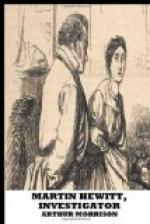“I had spoiled every plate I could find, and had the developed negatives safely in my pocket, when I happened to glance at a porcelain washing-well under the sink. There was one negative in that, and I took it up. It was not a negative of a drawing of yours, but of a Russian twenty-ruble note!”
This was a discovery. The only possible reason any man could have for photographing a bank-note was the manufacture of an etched plate for the production of forged copies. I was almost as pleased as I had been at the discovery of your negatives. He might bring the police now as soon as he liked; I could turn the tables on him completely. I began to hunt about for anything else relating to this negative.
“I found an inking-roller, some old pieces of blanket (used in printing from plates), and in a corner on the floor, heaped over with newspapers and rubbish, a small copying-press. There was also a dish of acid, but not an etched plate or a printed note to be seen. I was looking at the press, with the negative in one hand and the inking-roller in the other, when I became conscious of a shadow across the window. I looked up quickly, and there was Mirsky hanging over from some ledge or projection to the side of the window, and staring straight at me, with a look of unmistakable terror and apprehension.
“The face vanished immediately. I had to move a table to get at the window, and by the time I had opened it there was no sign or sound of the rightful tenant of the room. I had no doubt now of his reason for carrying a parcel down-stairs. He probably mistook me for another visitor he was expecting, and, knowing he must take this visitor into his room, threw the papers and rubbish over the press, and put up his plates and papers in a bundle and secreted them somewhere down-stairs, lest his occupation should be observed.
“Plainly, my duty now was to communicate with the police. So, by the help of my friend the barber down-stairs, a messenger was found and a note sent over to Scotland Yard. I awaited, of course, for the arrival of the police, and occupied the interval in another look round—finding nothing important, however. When the official detective arrived, he recognized at once the importance of the case. A large number of forged Russian notes have been put into circulation on the Continent lately, it seems, and it was suspected that they came from London. The Russian Government have been sending urgent messages to the police here on the subject.
“Of course I said nothing about your business; but, while I was talking with the Scotland Yard man, a letter was left by a messenger, addressed to Mirsky. The letter will be examined, of course, by the proper authorities, but I was not a little interested to perceive that the envelope bore the Russian imperial arms above the words ‘Russian Embassy.’ Now, why should Mirsky communicate with the Russian Embassy? Certainly not to let the officials know




